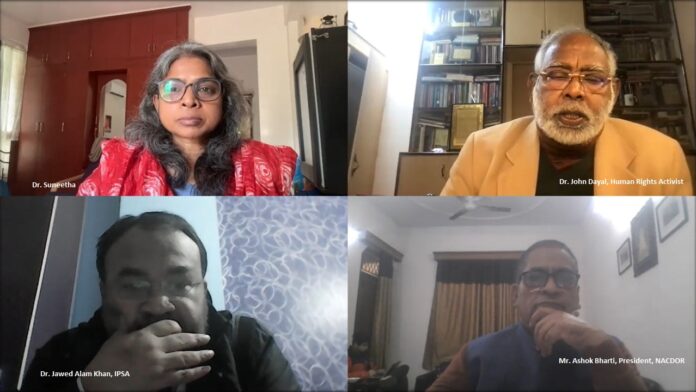Webinar: “Indian Constitution and Educational Rights of Minorities: Promises and Possibilities”
source: India Tomorrow
NEW DELHI—Various speakers at a webinar titled – Indian Constitution and Educational Rights of Minorities: Promises and Possibilities – felt that the Constitutional guarantees given to minorities were not fully implemented in the country.
The webinar was organised jointly by the Markazi Taleemi Board, the All India Education Movement, the Institute of Policy Studies and Advocacy (IPSA), the Holistic Education Board, and the Association of Minority Studies and Federation of Muslim Education Institutions (FMEI).
Noted human rights activist Dr John Dayal highlighted the violations of the Constitution that are taking place in the context of minority rights, freedom of religion and educational rights.
He added that the challenges to the judiciary’s independence and the erosion of key commissions meant for the protection of minorities and the marginalised communities were also major concerns.
The communalisation of education also has to be resisted, which Dr Dayal noted, is a point of concern in the National Education Policy as well.
Supreme Court lawyer MR Shamshad, said that Constitution of India is a political document that gave multiple rights to minorities. However, there is a need to focus to focus on implementing and interpreting Constitutional values and articles in line with the intended spirit.
He said that the disturbing push towards uniformity that is being imposed in Indian society and the Indian public sphere as if uniformity is the basic provision of the Indian Constitution, was also a matter of concern. He cited the Supreme Court verdicts that repeatedly call for the respect and protection of religious practices and rights, but many judgements have treated Article 30 exclusively, without connecting them to Articles 19 and 25.
Founder of Centre for Development Policy and Practice Amirullah Khan highlighted the ruling dispensation’s direct attack on the basic essence and principles of the Constitution, which was premised on justice and inclusion, particularly of minorities and vulnerable populations. He said that the Constitution’s progressive vision for uplifting minorities need to highlighted.
He pointed out that the steady decline of minority rights is a question of the identity of India itself. The economic concerns of the minority communities are also being sidelined, and the correlation between poverty levels and minority communities is also not being fully addressed.
NACDAOR National Confederation of Dalit and Adivasi Organisations(NACDAOR) chairman Ashok Bharti highlighted the need for different marginalised communities to work together rather than being driven to conflict based on divisive agendas that are being propagated. He spoke about the debates regarding minority reservations and the need to rely on accurate data while making claims towards minority reservations.
Dr A Suneetha, an Independent Researcher from Hyderabad, traced the history of minorities in post-Independent India and argued how higher educational institutions, particularly public universities were meant to act as open and critical public spheres. However, in light of recent developments including the removal of Maulana Azad National Fellowship and restrictions on other scholarships, it appears that these spaces are being tampered with.
Additionally, Dr Suneetha highlighted the issues of minorities within minorities, such as Muslim women.
Syed Tanveer Ahmed, Director, Markazi Taleemi Board lamented that lack of data about violation of minority rights and utilisation budgets for minority departments at the Centre and in state was the biggest hurdle in study of minority rights in the country.
He pointed out that several studies had shown that there was no sufficient data available neither with the government nor NGOs on violation of minority rights.
Speaking about the need to protect and promote the rights of oppressed classes, Mr Ahmed said that it is not enough to dedicate one day to the needs of minorities and their rights; it should be a consistent and continuous process.
He laid out the current dispensation’s attitudes towards madrasas, minority-run institutions including schools and higher institutions, and minority scholarships and fellowships.
MTB director stressed the need for minorities to become aware of their rights and their needs and to be able to understand the violations that are taking place. There is a lack of knowledge, clarity and accessible data and information on the extent of this violation of rights.
He also reiterated the flaws in the National Education Policy (NEP-2020) regarding minority rights, the dangers of homogenising ideas of culture, and the need for all-involved organizations to come together and work towards finding solutions.
The program was moderated by Dr Jawed Alam Khan, Senior Researcher at Institute of Policy Studies and Advocacy.
The welcome address was given by Dr Abdur Rashid Agwan, President of Institute of Policy Studies and Advocacy.
Dr Khalid Khan, a researcher at Indian Institute of Dalit Studies, Advocate Aslam from All India Education Movement, and Dr Manzoor Ali from Giri Institute of Development Studies also addressed the meeting.


Recent Comments